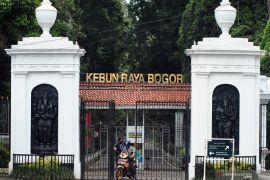"The government has submitted a bill on ratifying the Nagoya Protocol."Jakarta (ANTARA News) - Despite being one of the world`s most bio-diverse nations, Indonesia has yet to receive compensation for the utilization of its genetic samples by foreign researchers to develop high-value products.
As one of the countries with the largest areas of tropical forests, Indonesia is home to 10 percent of the world`s flowering plant species and 12 percent of all mammals.
Some of the plant and animal species are endemic, meaning that they are not found elsewhere in the world. Thus, it comes as no surprise if many foreign scientists conduct researches in Indonesia.
Data from the research and technology directorate of the Indonesian Institute of Sciences (LIPI) show the agency issued at least 600 permits to foreign researchers in 2010 and 2011.
However, not quite a few foreign researchers have illegally taken the genetic resources from Indonesia due in part to the absence of a benefit-sharing scheme.
Vice President Boediono said Indonesia will ratify the Nagoya Protocol on access to genetic resources and the fair and equitable sharing of benefits arising from their utilization to the convention on biological diversity.
"The government has submitted a bill on ratifying the Nagoya Protocol to the House of Representatives," he said at a function marking the National Love Flora and Fauna Day at the Vice Presidential Palace here on Monday.
The Environment Ministry submitted the bill to the parliament in the middle of September 2012, hoping it could be passed into law as early as the end of this year. The House of Representatives is in the process of holding hearings with experts and non-governmental organizations.
Boediono said it is important to ratify the protocol since Indonesia is one of the world`s genetic resource-rich countries.
"With the law, Indonesia will have a firm legal basis to protect and preserve its genetic resources and traditional knowledge related to genetic resources," he said.
The law will also ensure the fair and equitable sharing of financial and non-financial benefits arising from the utilization of genetic resources and traditional knowledge related to genetic resources to the genetic resources provider based on a common agreement, he said.
Above all, the law will lay a legal basis for the country to prevent theft and illegal utilization of biodiversity.
Environment Minister Balthasar Kambuaya said the law on ratifying the protocol is crucial because it had to do with the safety of the country`s natural resources and biodiversity.
The protocol gives at least three benefits to Indonesia as a mega-biodiversity country, he said at a function marking the launch of bamboo-planting movement on Jakarta`s southern outskirts of Cibinong late last September.
First, it will lay a basis for the adoption of rules governing access to the country`s biodiversity resources; second, it will give compensation to local people who have used the genetic resources for a long time; and third, it will help protect Indonesia`s biodiversity.
Ratifying the protocol is one of the efforts to enable the country to manage and benefit from the biodiversity, he said.
"We have so far been proud of being rich in natural resources. But it is the foreign nationals who have benefited from them, including by means of illegal attempts," he said.
Therefore, he added the law on ratifying the protocol will serve as legal guidance for the use of genetic resources nationwide.
The Nagoya Protocol was adopted by the Conference of the Parties to the Convention on Biological Diversity (CBD) at its tenth meeting on October 29, 2010 in Nagoya, Japan. The protocol is aimed at sharing the benefits arising from the utilization of genetic resources in a fair and equitable way. Indonesia signed the protocol on May 11, 2011.
Under the protocol, countries providing genetic resources would receive fair compensation for the use of their biological resources.
According to the CBD website, 92 countries signed the protocol when it was opened for signature from February 2, 2011 to February 1, 2012.
It is a long way to have the protocol implemented as less than 25 percent of signatories have ratified it. The protocol will come into force 90 days after the date of deposit of the fiftieth instrument of ratification.
A number of countries have ratified the protocol, including Gabon on November 11, 2011, Jordan on January 10, 2012, Rwanda on March 20, Seychelles on April 20, 2012, Mexico on May 16, 2012, Laos on September September 26, 2012, and India on October 9, 2012.
When the bill is passed into law, Indonesia will be the first of the world`s top ten nations to ratify the protocol.
Boediono said after ratifying the protocol, Indonesia will prepare a set of good operational instruments in order to implement it properly in the field.
(T.S012/KR-BSR/B003)
Reporter: by Suharto
Editor: Priyambodo RH
Copyright © ANTARA 2012






